Coronavirus: Businesses count the cost of cancelled events
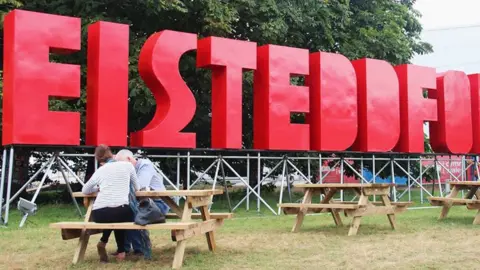 BBC
BBCThis weekend Machynlleth in Powys should have played host to its annual comedy festival.
But it is one of many major events in Wales either postponed or cancelled by the coronavirus pandemic.
The Welsh Government calculates the direct economic impact on events it supports at £33.35m.
Businesses that rely on the influx of festival-goers have found themselves closed at what is usually their most lucrative time of year.
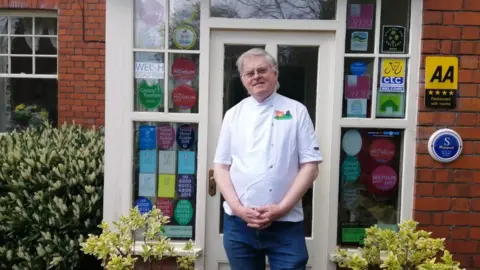
'It could not have been worse'
In Llanwrtyd Wells, Powys, Roger Stevens runs Lasswade Country House, an eight-bedroom restaurant with rooms.
He said: "At this stage, I will have lost - up until July - in the region of £50,000.
"Living and trading in an events town, it could not have been worse.
"The winter is used to repair, maintain and update our businesses, so coffers are depleted on the understanding that spring is on its way here for a new season."
He said he was thankful for the UK government emergency grant scheme which gives grants of up to £25,000.
"I am drawing on my own savings. As long as we don't eat into the season too far, we may be able to minimise our loses before going into the winter," he said.
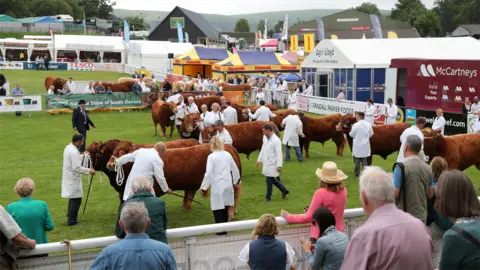 Getty Images
Getty Images'Very difficult'
The Royal Welsh Show was set to be held from the 20 July in Llanelwedd near Builth Wells, Powys, but will instead take place next year.
The show contributes more than £40m a year to the Welsh economy.
Its chief executive Steve Hughson said: "With the UK government's guidance on mass gatherings and social distancing we had no choice.
"We must secure the safety of all of our members, competitors, exhibitors and everybody else."
The Royal Welsh Agricultural Society has furloughed about 80% its staff.
"What is really important is that we must look ahead now to next year, and come out of this stronger," he said.
Mr Hughson, who also chairs the Mid Wales Tourism Forum, said he recognised the "terrible effect" the virus was having on local businesses.
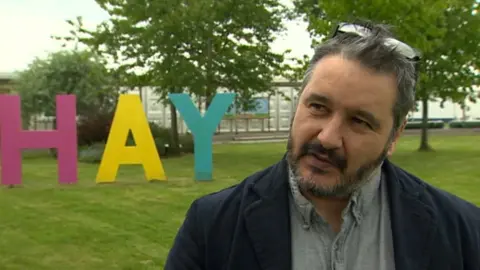
'Cash crisis'
Along the River Wye, the Hay Festival, which was due to take place later this month in Hay-on-Wye, Powys, has also been cancelled.
The festival's director, Peter Florence, said the timing of the pandemic put it in "immediate financial jeopardy".
"We had reached the very moment in the year when we had maximum outlay, and were just about to start bringing in the ticket money, on which we depend for 70% of our income every year," he said.
The festival brings an economic boost of about £28m every year to an area made up mostly of smaller, independent businesses and traders.
"That is a big chunk to take out of a local economy, and a local economy that doesn't have any major employers or industry," he said.
"We are motivated by wanting to make sure that we can come back, and keep working with, and surviving and thriving with all the people who make Hay."
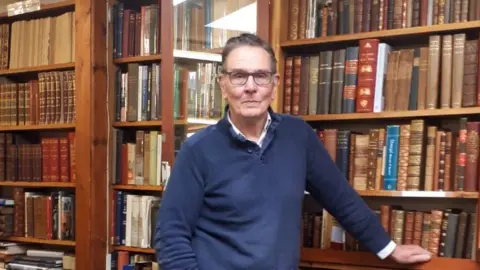
The town that lost its 'Christmas'
One of those people who "makes Hay" is Guy Coombes, who runs the Hay Cinema Bookshop.
For 30 years, the festival has brought people through its doors.
"The festival is like Christmas for high street shops - and a good Christmas meant you had a good year generally," he said.
"The loss of revenue to the company that runs the festival is going to be a massive blow, but we're all very hopeful that they can live to fight another day."
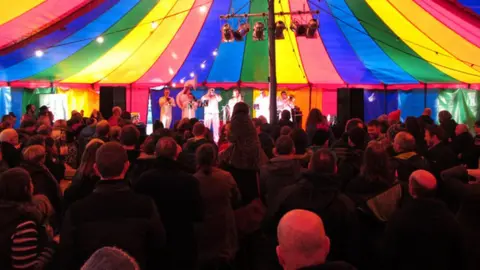 Gareth James/ Geograph
Gareth James/ Geograph'No safety net'
The Machynlleth Comedy Festival brings about 8,000 comedy fans to a town of just 2,500 each year.
It too has been cancelled but will instead be broadcast on BBC Radio Wales, featuring stand-up and cabaret originally scheduled for the live performance.
As an event, it contributes more than £1m to the Welsh economy.
Its director Henry Widdicombe said the decision to cancel it was one of both "responsibility and grief".
"It's not just a festival... we have 200 to 250 performers, a similar amount of crew, technicians, stage managers, and production staff.
"We have all the venues in town... there is such a big supply chain.
"You're looking at an industry that, in a way, is the very definition of a gig economy, in that if the tickets aren't sold and the gigs don't happen, there isn't any money there and there is no safety net."
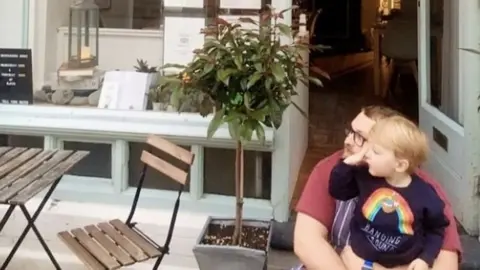
'A month's takings in three days'
Owner of Number 21 bistro in the town, Sam Vaughan, said he usually took a month's takings for the three days the festival is on.
Despite receiving a small government grant, he has had to furlough the restaurant's manager.
"The timing of everything has meant that we are having to be closed in what is one of the most lucrative parts of the year," he said.
"While I am very grateful, and desperately in need of that grant, it doesn't come close to what we have lost financially in being closed during this period.
"We're all looking forward to next year, when the comedy festival I'm sure will be back, bigger, better and stronger than ever, if possible."
The Welsh Government has announced funding of more than £800,000 will be shared by the Eisteddfod Genedlaethol and the Llangollen International Musical Eisteddfod.
A spokesperson said: "Wales' events will be greatly missed this year, but we've seen that many events have come up with innovative ideas for 2020 and will keep working with event owners on future plans."
